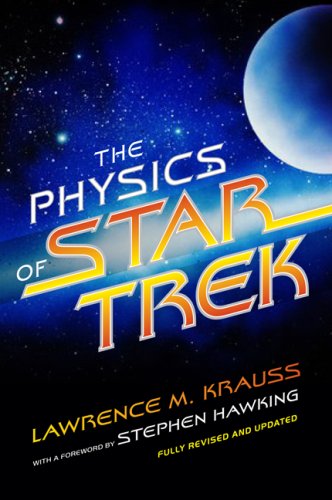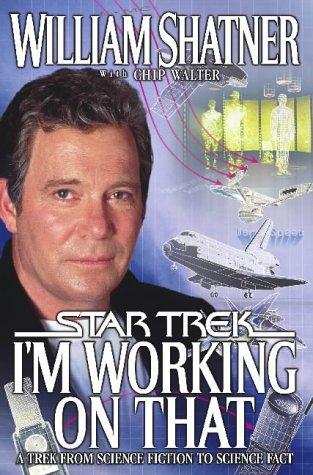Everyone knows that what you read in a fantasy novel or see in a "science" fiction movie isn't real science, but that doesn't stop real scientists from playing "what if?" Popular fiction is an excellent vehicle for transporting science into minds that might otherwise never have bothered. And if you've got someone on your shopping list who claims science isn't interesting but loves science-inspired entertainment, one of these books may be an ideal way to show them that real science isn't boring.
 The Physics of Star Trek by Lawrence M. Krauss. What can be better than a theoretical physicist poking holes in some of the more outrageous science fictions in Star Trek? Krauss takes on everything from the transporter (debunked) to time travel (eh - could be!). Heavy enough to slip in some real science, light enough not to send science phobes screaming in the opposite direction.
The Physics of Star Trek by Lawrence M. Krauss. What can be better than a theoretical physicist poking holes in some of the more outrageous science fictions in Star Trek? Krauss takes on everything from the transporter (debunked) to time travel (eh - could be!). Heavy enough to slip in some real science, light enough not to send science phobes screaming in the opposite direction.
And if that's not enough, there's also Beyond Star Trek, in which Krauss takes on the paranormal and destroys the idea that a huge-ass spaceship could hover over the White House without crushing it.
 The Science of Star Wars by Jeanne Cavelos. Of course, you can't just leave it at Star Trek! Cavelos takes on everything from the planets to the droids to the Force. C'mon... you know you wanna scientific rationale for the Force!
The Science of Star Wars by Jeanne Cavelos. Of course, you can't just leave it at Star Trek! Cavelos takes on everything from the planets to the droids to the Force. C'mon... you know you wanna scientific rationale for the Force!You can even read a few excerpts over at SciAm.com. You can tell by the excerpt titles that the whole book is snarky good science fun.
 The Physics of Superheroes by James Kakalios. This book is tremendous good news on three fronts: "First, a subject that everyone "knows" is difficult and boring can, in the hands of a master teacher, be both exciting and fun. Second, it's a myth that only people particularly adept at mathematics can understand and enjoy physics. Third, superhero comic books have socially redeeming qualities." I shall use it to beat snide literati over their heads until they stop disparaging my comics.
The Physics of Superheroes by James Kakalios. This book is tremendous good news on three fronts: "First, a subject that everyone "knows" is difficult and boring can, in the hands of a master teacher, be both exciting and fun. Second, it's a myth that only people particularly adept at mathematics can understand and enjoy physics. Third, superhero comic books have socially redeeming qualities." I shall use it to beat snide literati over their heads until they stop disparaging my comics. I'm Working on That by William Shatner. I know. You all want a science book written by William Shatner the same way you want that mad dentist guy in Alias to drill your teeth. I wouldn't recommend this particular book if I hadn't read it and loved it personally, though. And this could be the best ever for getting the reluctant science fan deeply immersed in science. Shatner takes us on a journey from science lab to science discovery, starting out as a reluctant explorer and ending up an enthusiast. It's beautifully written, whimsical and fun, a hugely entertaining journey into unknown territory. In fact, it reminds me a lot of Star Trek....
I'm Working on That by William Shatner. I know. You all want a science book written by William Shatner the same way you want that mad dentist guy in Alias to drill your teeth. I wouldn't recommend this particular book if I hadn't read it and loved it personally, though. And this could be the best ever for getting the reluctant science fan deeply immersed in science. Shatner takes us on a journey from science lab to science discovery, starting out as a reluctant explorer and ending up an enthusiast. It's beautifully written, whimsical and fun, a hugely entertaining journey into unknown territory. In fact, it reminds me a lot of Star Trek....
Science of Discworld I, II and III by Terry Pratchett et al.
It's no secret that I'm a ginormous Terry Pratchett fan, and one of the singular delights in reading his books is the way quantum physics sneaks in to a world riding on the backs of four elephants standing on a turtle swimming through space. Who doesn't giggle at the Trousers of Time? Or delight in L-Space? I haven't had the chance to read these - I didn't even know they existed until tonight - but the reviewers assure me the science within is teh awesome. Terry not only tells us the facts, but shows us how science discovers them - which is the single most important part of science, innit?









5 comments:
How can you debunk a technology which hasn't been invented yet? It seems to me the most you could do is say "What they do here in episode X with gizmo Y is inconsistent with what they do over here with the same gizmo in episode Z, unless they've found a way to break one or more o' th' following laws o' physics...
I don't have the book, so I don't know what the argument is for the impossibility of a huge-ass spaceship hovering over the White House without crushing it, but I can think of any number of ways it could work:
* Force field which spreads the load over a sufficiently wide area (or perhaps "pushes" against the ground underneath the WH, which should be able to take the load)
* Reactionless drive, anyone? (We think it's probably impossible, but you're allowed at least one impossible premise per SF story; it just has to appear before the main plot gets underway.)
* Gravity nullifier (ibid.)
* Tractor beam (or, hell, a set of variable-length self-repairing buckytube nanoropes... but elsewhere, it's indicated that they do have forcefield tech, so tractor beams seem entirely plausible) to a similarly massive object in an orbit way outside geosynchronous (to provide an equal force in the other direction).
The only thing I really found implausible about Independence Day was that a civilization as technologically advanced as that would so desperately want our planet and yet waste all that time killing us and destroying our infrastructure rather that starting in with whatever it was they actually wanted to do with the planet (landing refugees, mining it, whatever). Hey, maybe they've got neocons! Those buggers can be damn difficult to get rid of, as we learned a few years later.
Oh, and of course the idea that we would have had, in 1996, a computer virus advanced enough to overpower such a computer. (Using Slim Whitman recordings to make aliens' heads explode seems only slightly less probable by comparison.)
Just call me skeptical of excessive skepticism...
Slight partial rephrase of last full paragraph (two different versions of the sentence got intermangled): Oh, and of course the idea that we would have had, in 1996, malware advanced enough to overpower the fleet main computer of such a technologically advanced civilization.
A couple of other good books in this genre:
Jeanne Cavelos also wrote The Science of The X Files.
There were two different books written about the biology of Star Trek:
Life Signs: The Biology of Star Trek by Susan and Robert Jenkins
To Seek Out New Life: The Biology of Star Trek by Athena Andreadis
The Jenkins are medical doctors, and Ms. Andreadis is a neuroscientist. I haven't seen any in print for some time, but it's possible you can find them somewhere.
Since I have yet to see a force field that can do what alien's force fields did without some rather startling side effects, I'd have to say that I found everything about Independence Day implausible, Woozle.
"Since I have yet to see a force field that can do what alien's force fields did without some rather startling side effects..." I'm not sure I'm getting your point here, Cujo.
Are you saying there is internal inconsistency in the way the force fields were presented, or are you saying that they're impossible because you haven't seen any such force fields in real life? If the former, what's the inconsistency -- what side-effects would you expect? (I can only presume you don't mean the latter, although it almost sounds that way.)
Post a Comment